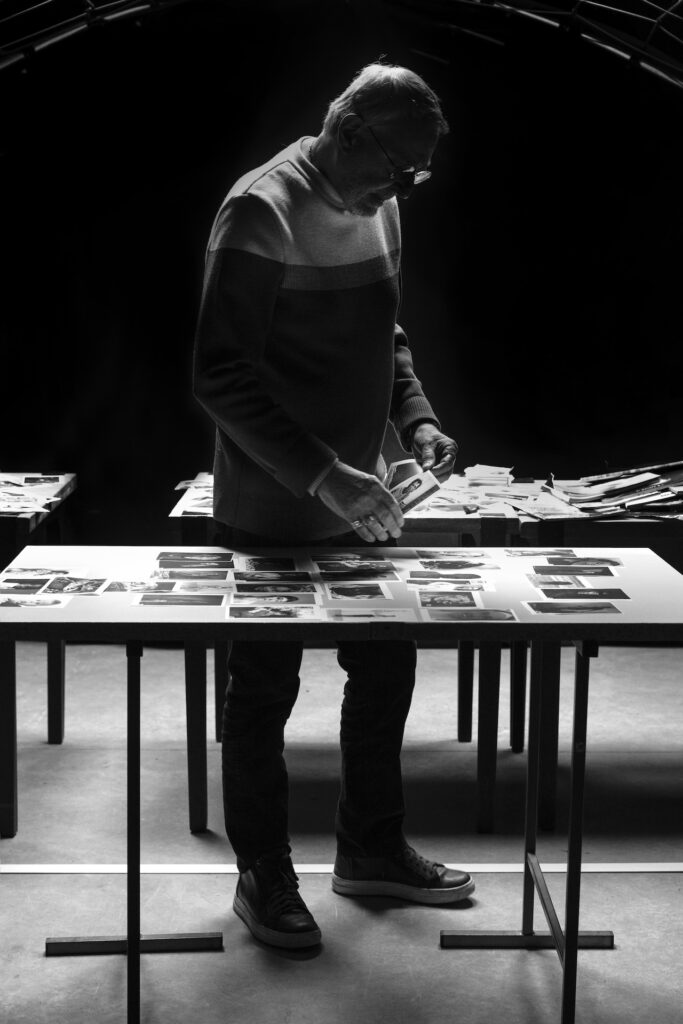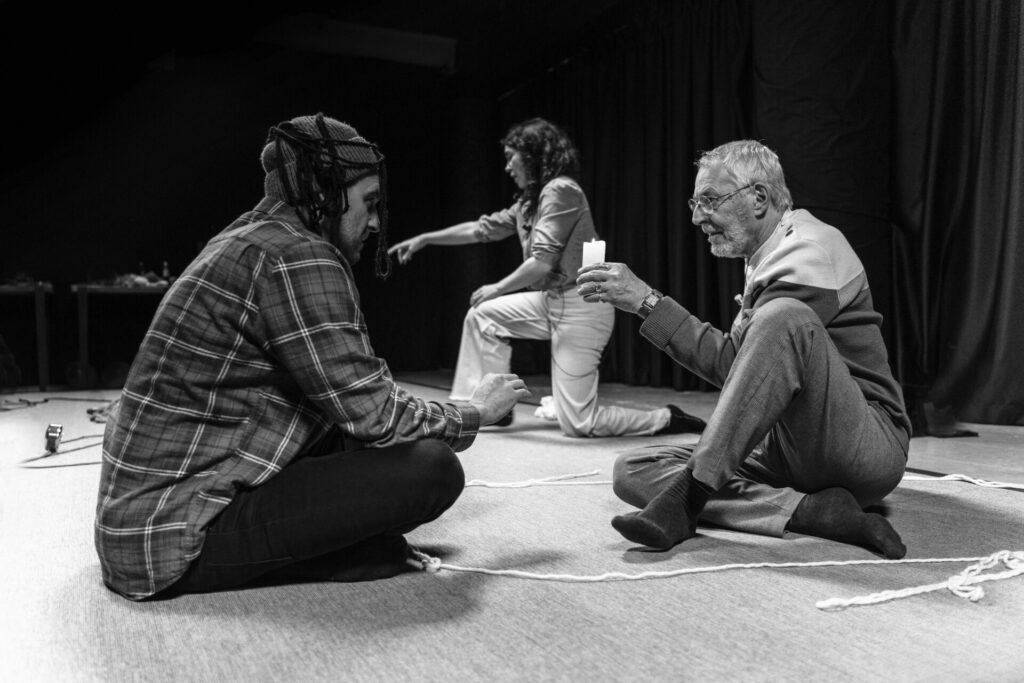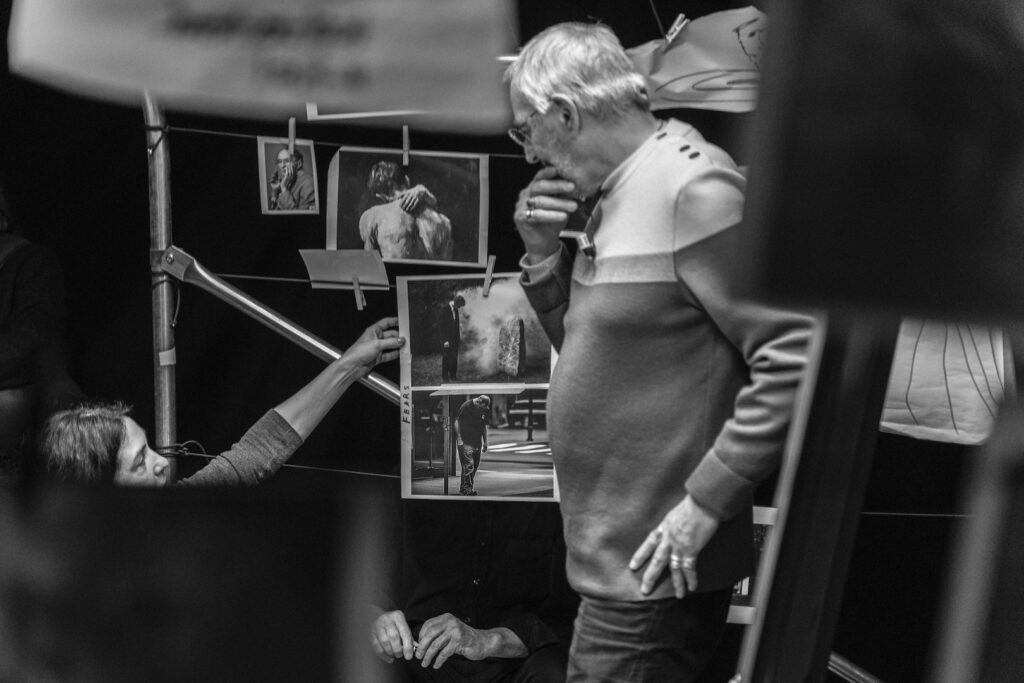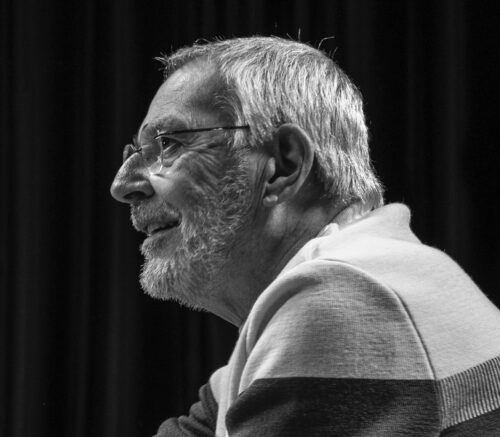Marcel Beaulieu
Marcel Beaulieu is a Canadian screenwriter with over forty years of experience. He has written or co-written some sixty screenplays, almost all for the big screen. He won the Swiss Film of the Year Award for “Coeur Animal” by Séverine Cornamusaz, the Best Screenplay Award at the Namur Film Festival for “Looking for Alexander” by Francis Leclerc, and the Best Screenplay Award at FESPACO in 2015 for “Fadhma N’Soumer” by Belkacem Hadjadj. The films he has worked on have won over 200 national and international awards, including a Golden Globe for “Farinelli” by Gérard Corbiau. He has also led screenwriting workshops around the world, from Yaoundé to Algiers, Burkina Faso, Mali, Switzerland, the Republic of Congo, Beirut, Cairo, and Marrakech. He has been a key consultant for Groupe Ouest since 2007.
— As part of its 5th season, the StoryTANK team wanted to try a new experiment, under the guidance of six passionate and captivating researchers. The goal was to test and film the emergence of story ideas within experimental frameworks created by LA FABRIQUE DES MONDES — a unique initiative in Europe, developed at Le Groupe Ouest since 2023, under the auspices of the French Ministry of Culture.
The experience was offered to six screenwriters or filmmakers from six different European countries. Here, the StoryTANK provides an opportunity to explore and shed light on the creative process.
Below, a debrief by Marcel Beaulieu, as she reflects on his experience.
CREATION, A UNIQUE EXPERIENCE : REFLECTIVE AND ABSOLUTE
“Creation is life: a profound feeling, that of understanding, transmitting, and receiving.”
One of the things most lacking in creation is reflection. You always have to produce quickly, instantly, with a need for performance that, for me, is counterproductive. To compose a story, you need the freedom to explore, to try things, to verify. A rare freedom that allows for perspective, generating a form of hope in what you might achieve.
STORYTELLING: A SHARED UNIVERSE, A COLLECTIVE JOURNEY
“Working on a story collectively means accepting a common path.”
When I work with authors, what interests me is how we can share a universe, establish a journey together. We don’t know where we’ll end up together, but that’s not a big deal: it’s the acceptance of the exploratory path that matters.

THE BLACK ROOM
REVEALING THE UNKNOWN WORLDS OF THE STORY
“ The Black Room is like a Native American sweat lodge: you forget everything superfluous.”
e Black Room is a place that reveals. In Native American culture, sweat lodges are built: you enter a completely dark teepee with embers heating the stones, making you sweat, but in a good way. You don’t feel any pain from the heat; you feel like a lot of things are being expelled from you and immersing you in worlds you don’t know. e Black Room takes us into inner, shared worlds that even the author doesn’t know, which we discover by entering it: an extraordinary experience. In the Black Room, we are forced to be with ourselves and the people we encounter. We forget the superficial, the superfluous. The Black Room opens up immense possibilities.
THE LOSS OF REFERENCE POINTS IN DARKNESS TO SEEK THE LIGHT OF THE STORY
“ The Black Room is a short circuit between reality and unconsciousness.”
With the darkness of the Black Room, we are forced to seek the light of something. We don’t know what. We are forced to illuminate ourselves from within, and the character, lost in a no man’s land, is forced to say to himself: yes, I have two legs, I have two arms, I have a head. But what is inside us? The Black Room is a short circuit between reality and unconsciousness. Suddenly, something is happening, because we no longer have any reference points. e Black Room forces you to enter into what you are and into your own impossibilities and all the perspectives that can arise. You’re confronted with yourself, and then, wow, that’s great! An author has to confront that!
THE PLATEAU
AN AWARENESS OF THEATRICALITY
“Being touched by the theatricality of the story”
With the Plateau, there is a form of theatricality of the story, more precisely : a collective awareness of the theatricality of the story in composition that really touched me.

BRINGING OUT YOUR CHARACTER TO CONFRONT THE STORY
“On the Plateau, I’m immersed in this character who overwhelms me”
Many writers are afraid to confront their characters. There are many characters within us, a thousand of them!: extreme characters, violent ones, gentle ones, lovers, disappointed ones. During the Plateau, we bring out these characters. These characters that we have trouble facing, that we don’t always want to hear. Here, the character is in front of me, and it touches me. I’m no longer just overwhelmed, I’m immersed in this character, and it overwhelms me.
COLLECTIVE MEMORY TO COMPOSE AND SHARE THE STORY
“Each character comes from thousands of characters who want to tell stories, through us”
With the Plateau, a character emerges instantly, beyond me. Collective memory is fundamental. Each character comes from thousands of characters who want to tell stories, through us. What moved me about the Plateau were these objects that have their own life, that have had their own life. And now it’s up to each of them to compose a story with what has been brought back from who knows where, from a thousand-year-old past or the recent past. There is, then, a real connection with the character and an irresistible desire to see, observe, experience, and share: how this story will be understood by others…

THE FACTORY OF WORLDS
STORYTELLING, A SHARED COSMOGONY
“Without sharing, there is no story.”
The Black Room and the Plateau, shared with two other people, are a world, a universe. And we must try, beyond each person’s cosmogony, to understand, beyond bringing us together: what we can share. With authors, I like to share, I like to listen, I like to walk with them.

WRITING IS A DIALOGUE WITH ONESELF, TO BE OPENED WITH OTHERS.
“ There is a form of madness, a necessary schizophrenia in creation.”
Without madness, we do things that everyone expects, that everyone wants. is madness is a schizophrenia. Writing is a dialogue, one that I constantly have with myself, which allows me to maintain balance. Why can’t I find the idea? Why can’t I find the character’s trajectory? Why? Because the problem is within me, it’s not outside. It’s always inside me: the problem is in my head, and THE FACTORY OF WORLDS operates precisely there.
OVERCOMING FEAR TO MOTIVATE THE STORY
“With THE FACTORY OF WORLDS, we get naked: we jump into the water and swim with others.”
I was terrified. I’m always afraid. I think it’s part of my nature. And so I have to get naked. Ah! We don’t always like our bodies, we don’t always like who we are. And I admit that this fear motivated me, because it’s like when you jump into the water: I had to swim, and I swam with others!

THE CONSTRUCTION OF A STORY IS A TRANSMISSION
“THE FACTORY OF WORLDS generates a cerebral electricity that allows us to connect with others and with the story.”
I draw from the experimental devices of THE FACTORY OF WORLDS: impressions, a form of cerebral electricity that works on me, that speaks to me, and that allows me to connect with others, to see how I can transmit the energy I have been able to draw from them. Because all creation is a question of transmission.
